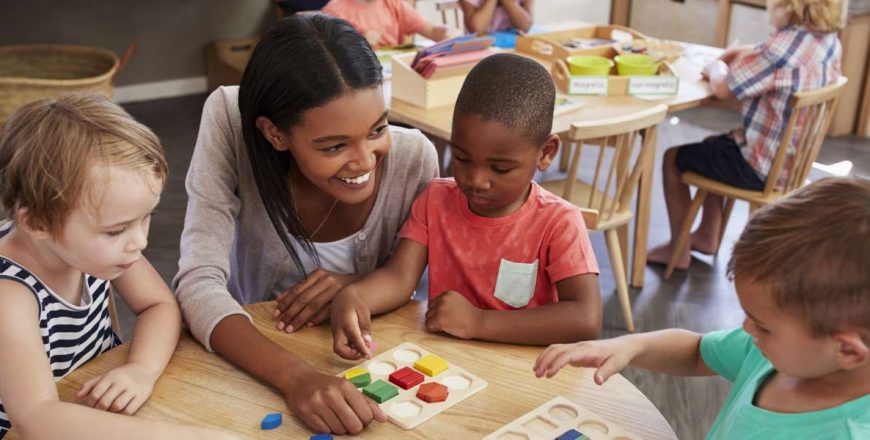
On an early years practitioner apprenticeship course, you’ll help support child-initiated and adult-led activities based on the needs and interests of each child.
As an early years practitioner, you will work directly with children aged newborn to five, aiding in the planning and executing activities, purposeful play opportunities, and educational programmes.
You will be responsible for fostering children’s learning via planned, purposeful play opportunities and educational programmes and working as part of a team to ensure each child feels safe and comfortable.
You will also support the observation and assessment of each child, contribute to their learning experiences, and assist with their care needs, such as teeth, skin, hair, feeding, changing diapers, and toileting, under the supervision of a more senior member of the team.
You’ll be responsible for recognising when a child is in danger or at risk of significant damage or abuse, as well as ensuring the health and safety of the children, staff, and anyone on the premises.
What you’ll learn
On an early years practitioner apprenticeship course, you’ll learn to:
- Assist babies and young children with a range of transitions, such as beginning school, moving home, or the arrival of a sibling.
- Recognise when a kid is in danger, at risk of significant damage or abuse, and explain how to safeguard them. Abuse may take many forms, including domestic violence, neglect, physical, emotional, and sexual abuse.
- Recognise potential risks and dangers at work and on off-site travels.
- Demonstrate knowledge and skills in infection prevention and control, such as hand washing, food preparation and cleanliness, dealing with spills and trash, and using appropriate personal protective equipment.
- Encourage youngsters to be conscious of their safety and the safety of others and establish personal hygiene habits (including oral hygiene).
- Promote health and wellbeing in settings, encourage babies and young children to consume healthy and balanced meals, snacks, and beverages appropriate for their age, and be physically active throughout the day, both indoors and outside.
- Encourage babies and little children to communicate in a variety of ways.
- Use a range of communication styles while communicating with youngsters and adults.
- Collaborate with colleagues to discover and organise enabling settings, activities (both inside and outdoors), play opportunities, and educational programmes (both adult-led and child-led) to promote children’s holistic development via play, creativity, social development, and learning.
- Implement and assess activities that encourage children’s play, creativity, social development, and learning and clean up afterwards.
- Observe children, analyse, plan, and record results, and disseminate findings appropriately and discretely in line with the necessary statutory framework and establishing standards.
- Use learning activities to help children build their early language abilities.
- Encourage young children’s interest in making marks, writing, reading, and being read to.
- Encourage children’s interest in and progress in mathematical learning, such as numbers, number patterns, counting, sorting, and matching.
- Assist in the assessment, planning, implementation, and (gradual) revision of each baby’s and young child’s individualised plan for care and engagement.
- Work using strategies that recognise and respect babies and children’s developmental requirements and stages.
- Use feedback, coaching, and/or supervision to identify and support areas for development, aims, and career possibilities.
- Collaborate with coworkers, other experts, and organisations to meet the requirements of babies and early children and assist them in developing.
- Collaborate with parents and/or caregivers and recognise their engagement in the baby’s/health, child’s wellbeing, learning, and progress.
- Encourage parents and/or carers to actively engage in their child’s/child’s/care, caregiver’s baby’s play, learning, and development.
Entry requirements
You’ll usually need:
- Checks as per EYFS requirements to ensure suitability to work with children.
- Apprentices without level 2 English and maths will need to achieve this level before taking the end-point assessment.
- Pass enhanced background checks
Assessment methods
The End Point Assessment consists of two distinct assessment methods:
- Knowledge Test
- Professional Discussion underpinned by the Portfolio
Duration, level, subjects and potential salary upon completion
- Duration: 12 months
-
Level: 2 – Intermediate Apprenticeship
- Relevant school subjects: English and PE
- Potential salary upon completion: £18,000
Apprenticeship standard
More information about the Level 2 Early Years Practitioner Apprenticeship standard can be found here.
Apprenticeship end point assessment
For more information about the End Point Assessment Process, please read the Institute of Apprenticeships’ information page.
